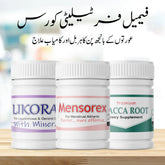Common Causes of Male Infertility: Complete Guide to Understanding & Treatment
Introduction
Male fertility has become a pressing global health concern, with roughly 1 in 6 worldwide experiencing infertility. Recent statistics reveal that the male is solely responsible in about 20% of cases and is a contributing factor in another 30% to 40% of all infertility cases. Understanding the causes of male infertility is crucial for couples struggling to conceive, as early identification and proper treatment can significantly improve outcomes.
The decline in male fertility has reached alarming proportions, with an estimated 7% of all men impacted by infertility. This comprehensive guide explores the primary causes of male infertility and discusses effective herbal solutions that can help restore reproductive health naturally.
Primary Causes of Male Infertility
1. Sperm Production Disorders
Sperm production disorders represent the most common causes of male infertility. These conditions affect the quantity, quality, or motility of sperm, making conception difficult or impossible.
Oligospermia (Low Sperm Count): This condition affects millions of men worldwide and occurs when the sperm concentration falls below 15 million sperm per milliliter of semen. Various factors contribute to low sperm count, including hormonal imbalances, genetic factors, and environmental exposures.
Azoospermia (No Sperm): According to reports, 10-15% of infertile men have a complete lack of sperm. This condition can be obstructive (blockage preventing sperm from reaching the ejaculate) or non-obstructive (failure to produce sperm).
Asthenospermia (Poor Sperm Motility): When sperm cannot swim effectively toward the egg, fertilization becomes nearly impossible. This condition often coexists with other sperm disorders.
For men facing these challenges, the Special Fertility Course offers a comprehensive natural approach to improving sperm production and quality through targeted herbal solutions.
2. Hormonal Imbalances
Hormonal disruptions significantly impact male fertility by affecting sperm production and sexual function. The hypothalamic-pituitary-gonadal axis controls male reproductive hormones, and any disruption can lead to infertility.
Testosterone Deficiency: Low testosterone levels directly affect sperm production and libido. This condition, also known as hypogonadism, can result from various factors including aging, obesity, and certain medications.
Thyroid Disorders: Both hyperthyroidism and hypothyroidism can disrupt sperm production and affect overall reproductive health.
Prolactin Elevation: High prolactin levels can suppress testosterone production and reduce sperm count.
3. Genetic Factors
Genetic abnormalities account for a significant portion of male infertility cases. These conditions can affect chromosome structure, gene function, or both.
Klinefelter Syndrome: This chromosomal condition affects approximately 1 in 500 men and often results in small testes and reduced testosterone production.
Y-Chromosome Microdeletions: These genetic deletions affect sperm production and can be passed to male offspring.
Cystic Fibrosis Gene Mutations: Men with certain cystic fibrosis gene mutations may have absent or blocked vas deferens, preventing sperm from reaching the ejaculate.
4. Anatomical Abnormalities
Structural problems in the male reproductive system can prevent sperm from reaching their destination or affect sperm quality.
Varicocele: This condition involves enlarged veins in the scrotum that can increase testicular temperature and impair sperm production. Varicoceles are present in approximately 15% of healthy men but occur in up to 40% of infertile men.
Undescended Testicles: When one or both testicles fail to descend into the scrotum during fetal development, it can affect sperm production due to increased temperature.
Blocked Ducts: Obstructions in the vas deferens, epididymis, or ejaculatory ducts can prevent sperm from mixing with seminal fluid.
5. Environmental and Lifestyle Factors
Modern lifestyle choices and environmental exposures have become major causes of male infertility. Proposed explanations include lifestyle factors, such as changes in diet and physical activity levels, and increased exposure to endocrine disrupting chemicals.
Chemical Exposure: Exposure to environmental endocrine disrupting chemicals (e.g., plasticizers, bisphenol A, and phthalates) has been linked to declining sperm quality and count.
Heat Exposure: Prolonged exposure to high temperatures from hot tubs, saunas, tight clothing, or occupational heat sources can impair sperm production.
Smoking and Alcohol: Lifestyle factors such as smoking, excessive alcohol intake and obesity can affect fertility. These substances can damage sperm DNA and reduce overall reproductive health.
Stress: Chronic stress elevates cortisol levels, which can suppress testosterone production and sperm quality.
6. Medical Conditions and Treatments
Certain medical conditions and their treatments can significantly impact male fertility.
Infections: Sexually transmitted infections, urinary tract infections, and other infections can cause scarring or inflammation that affects sperm production or transport.
Cancer Treatments: Chemotherapy and radiation therapy can severely damage sperm production, sometimes permanently.
Medications: The use of anabolic steroids can cause abnormal semen parameters such sperm count and shape. Other medications including certain antidepressants, blood pressure medications, and anti-seizure drugs can also affect fertility.
Diabetes: Uncontrolled diabetes can lead to erectile dysfunction and retrograde ejaculation, both of which can impact fertility.
Natural Solutions and Herbal Treatments
With around half of all male infertility cases, the cause is unexplained, many men are turning to natural and herbal solutions to improve their reproductive health. Research has shown promising results for various herbal remedies in treating male infertility.
Proven Herbal Remedies
Ashwagandha: Herbs like Ashwagandha and maca root help in increasing sperm count, quality, and semen volume. They also support the secretion of testosterone levels. This adaptogenic herb has been extensively studied for its fertility-enhancing properties.
Tribulus Terrestris: This herb has been traditionally used to improve male sexual function and boost testosterone levels naturally.
Ginseng: Herbs like Panax ginseng, maca, and ashwagandha have also been suggested, with some studies indicating potential benefits.
Saw Palmetto: Saw palmetto is renowned for supporting prostate health and regulating male hormonal levels, including dihydrotestosterone (DHT).
The Special Fertility Course combines these powerful herbs in a scientifically formulated blend designed to address multiple causes of male infertility simultaneously.
Lifestyle Modifications
In addition to herbal solutions, certain lifestyle changes can significantly improve male fertility:
Nutritional Support: A diet rich in antioxidants, vitamins, and minerals supports healthy sperm production. Key nutrients include zinc, selenium, vitamin E, and folate.
Regular Exercise: Moderate physical activity can boost testosterone levels and improve overall reproductive health.
Stress Management: Techniques such as meditation, yoga, and adequate sleep can help maintain hormonal balance.
Weight Management: Rising rates of obesity have been linked to male infertility. Maintaining a healthy weight is crucial for optimal fertility.
When to Seek Professional Help
While herbal solutions can be highly effective, it's important to know when professional medical evaluation is necessary. Couples should consult a healthcare provider if they have been trying to conceive for:
- 12 months without success (if the female partner is under 35)
- 6 months without success (if the female partner is over 35)
- If there are known risk factors for infertility
A comprehensive fertility evaluation can identify specific causes of male infertility and guide appropriate treatment decisions.
The Role of Comprehensive Treatment
Addressing male infertility often requires a multifaceted approach. The Special Fertility Course provides a holistic solution that combines traditional herbal solutions with modern understanding of male reproductive health.
This comprehensive program addresses:
- Hormonal imbalances through natural regulation
- Sperm quality improvement through targeted nutrition
- Stress reduction and lifestyle optimization
- Detoxification from environmental toxins
Prevention and Long-term Fertility Health
Prevention remains the best strategy for maintaining male fertility. Key preventive measures include:
Environmental Awareness: Limiting exposure to chemicals, pesticides, and other environmental toxins can protect reproductive health.
Regular Health Monitoring: Routine check-ups can identify and address potential fertility issues early.
Healthy Lifestyle Choices: Avoiding smoking, limiting alcohol consumption, and maintaining a healthy weight are fundamental to reproductive health.
Nutritional Supplementation: Using quality herbal solutions like those found in the Special Fertility Course can provide ongoing support for male reproductive health.
Conclusion
The causes of male infertility are diverse and often interconnected, affecting millions of men worldwide. From hormonal imbalances and genetic factors to environmental exposures and lifestyle choices, understanding these causes is the first step toward effective treatment.
While conventional medical treatments have their place, herbal solutions offer a natural, safe, and effective approach to improving male fertility. The growing body of research supporting traditional remedies validates what many cultures have known for centuries – that nature provides powerful tools for healing and restoration.
For men facing fertility challenges, taking a proactive approach through lifestyle modifications, stress management, and targeted herbal solutions can make a significant difference. The journey to parenthood may seem challenging, but with the right knowledge, support, and natural treatments, many men can overcome fertility obstacles and achieve their dream of fatherhood.
Remember, fertility is a couple's journey, and addressing male factors is just as important as addressing female factors. With comprehensive care, patience, and the right herbal solutions, many couples can successfully overcome infertility and welcome healthy children into their families.








